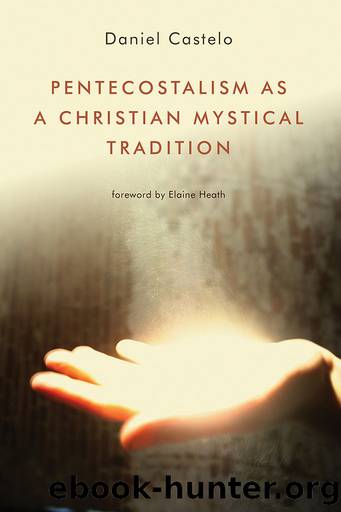Pentecostalism as a Christian Mystical Tradition by Castelo Daniel;Heath Elaine;

Author:Castelo, Daniel;Heath, Elaine;
Language: eng
Format: epub
Publisher: Eerdmans
Part of the importance of Oliverioâs study is the manner in which he expands and nuances the first type. He recognizes that Pentecostals held to the authority of Scripture in what can be deemed a âProtestant wayââthat is, in considering it primarily authoritative for matters of faith and practiceâyet a major feature of this approach was to see Scripture as providing ânormative exemplars for Christian experience.â65 That is, Scripture can be considered a primary authority in various ways; the Pentecostal view of scriptural authority was both similar to and different from Protestants generally and evangelicals in particular. The similarities are often on display in the tendencies by early Pentecostals to believe that Scripture can be taken âat face valueâ and that the âplain senseâ is available to those who have a proper spiritual disposition.66 In this, they sounded exceedingly close to a Baconian/common-sense paradigm, which would not necessarily be surprising, given the Christian subcultures out of which Pentecostalism emerged.67
But there are differences as well as similarities in the hermeneutics of early Pentecostals and evangelicals. Oliverio insightfully remarks that the willingness of Pentecostals to allow their theology to be interpreted by charismatic experience made for an interactive dynamic between theology and experience. This openness represents âan attempt to resolve the modern Protestant divide on the matter of theological method. The authority of the Bible (orthodoxy) is interwoven with the primacy of religious experience (both in orthopraxis and orthopathos). This is a movement, then, though not a consciously theoretical one, toward a way beyond the divide between the biblical propositionalism of conservative Protestantism and the placing of the locus of divine revelation on religious experience as in liberal Protestantism.â68 So while the views of early Pentecostals on the perspicuity of Scripture might make them sound Protestant in their orientation, the way they integrated their experience with their vision of âthe apostolic faithâ in order to live it out practically makes their approach unique. This orientation allows for a different kind of nuance, one that opens up mystical dimensions to the spiritual reading of Sacred Writ.
It is thus no surprise that some Pentecostal scholars have opted to emphasize hermeneutical continuity with evangelicalism, while others have stressed discontinuity. Much depends on the sources one uses. The second of Oliverioâs types, the Evangelical-Pentecostal hermeneutic, also supports those who stress continuity between the groups, for they would be inclined to see the second type as a further development of the first type. All these efforts to contextualize and describe Pentecostalism within broader traditions might help weaken the argument that the Pentecostal movement simply âfell out of the sky,â but they also have the concomitant effect of blurring the distinctive features of this unique group.
Pneumatic Interpretation
Broadly, one could say that Pentecostals read Scripture not so much to encounter the facts or truths of the Christian faith as to encounter the living God of Christian confession. That is, the Pentecostal hermeneutical orientation is relational and experiential to its core, especially when on display within the broader gamut of their practiced spirituality.
Download
This site does not store any files on its server. We only index and link to content provided by other sites. Please contact the content providers to delete copyright contents if any and email us, we'll remove relevant links or contents immediately.
Signature in the Cell: DNA and the Evidence for Intelligent Design by Stephen C. Meyer(2879)
Real Sex by Lauren F. Winner(2869)
The Holy Spirit by Billy Graham(2779)
The Secret Power of Speaking God's Word by Joyce Meyer(2755)
The Gnostic Gospels by Pagels Elaine(2400)
Jesus by Paul Johnson(2230)
Devil, The by Almond Philip C(2206)
23:27 by H. L. Roberts(2144)
The Nativity by Geza Vermes(2116)
Chosen by God by R. C. Sproul(2056)
All Things New by John Eldredge(2052)
Angels of God: The Bible, the Church and the Heavenly Hosts by Mike Aquilina(1870)
Angels by Billy Graham(1844)
The Return of the Gods by Erich von Daniken(1841)
Knowing God by J.I. Packer(1724)
Jesus of Nazareth by Joseph Ratzinger(1709)
Evidence of the Afterlife by Jeffrey Long(1705)
The Gnostic Gospel of St. Thomas by Tau Malachi(1680)
How To Be Born Again by Billy Graham(1670)
